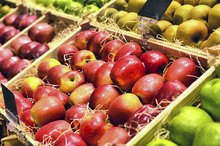Foods to Stop Loose Stools
When diarrhea has you running for the bathroom more than normal, life can be a real drag. The first step is to see your doctor to rule out any serious underlying condition. Next, you'll have to adjust your diet so that you avoid foods that can potentially worsen your condition. In addition, certain foods may help put an end to your misery.
Whole Grains
Whole grains like oats, bran and barley may help treat your diarrhea because they are rich in fiber. The University of Maryland Medical Center reports that fiber can be used to treat mild to moderate cases of diarrhea 24. One type of fiber, soluble fiber, attracts excess water in the intestines, which can help make your stool firmer. If your diet hasn't been high in fiber previously, don't increase your intake suddenly, as that can worsen your condition.
- Whole grains like oats, bran and barley may help treat your diarrhea because they are rich in fiber.
- One type of fiber, soluble fiber, attracts excess water in the intestines, which can help make your stool firmer.
Fermented Milk and Yogurt
The Best Food for Diarrhea
Learn More
Yogurt contains good bacteria called probiotics, which promote digestive health. A study published in the "International Journal of Clinical Practice" in November 2000 looked at the effects of diarrhea in children who drank milk fermented with Lactobacillus casei cultures versus traditional yogurt without those cultures 3. Researchers found that diarrhea was significantly reduced in the group supplemented with 100 grams daily of the L. casei fermented milk. You can look for yogurt products in your local market that contain live and active cultures including L. casei.
- Yogurt contains good bacteria called probiotics, which promote digestive health.
- A study published in the "International Journal of Clinical Practice" in November 2000 looked at the effects of diarrhea in children who drank milk fermented with Lactobacillus casei cultures versus traditional yogurt without those cultures 3.
Vegetable Juices and Broths
The University of Maryland Medical center recommends consuming vegetable juices, especially those made with carrot and celery, and clear broths or miso soup when experiencing loose stools 24. While these foods may not stop loose stools, they will help maintain fluid levels and electrolyte balance, which will prevent your condition from worsening and may promote a faster recovery.
Considerations
Does Activia Work for Constipation?
Learn More
There are some foods you should categorically avoid when experiencing diarrhea. Spicy foods and high-fat foods can make loose stools worse, regardless of cause. Depending on the cause of your diarrhea, milk products and high-fiber foods may also worsen your condition, which is why it's important to consult your doctor if your diarrhea doesn't resolve itself within a few days.
- There are some foods you should categorically avoid when experiencing diarrhea.
- Depending on the cause of your diarrhea, milk products and high-fiber foods may also worsen your condition, which is why it's important to consult your doctor if your diarrhea doesn't resolve itself within a few days.
Related Articles
References
- Oncology Nutrition: Constipation, Diarrhea and Fiber
- University of Maryland Medical Center: Fiber
- International Journal of Clinical Practice: Multicentric Study Of The Effect Of Milk Fermented By Lactobacillus Casei On The Incidence Of Diarrhoea.
- University of Maryland Medical Center: Diarrhea
- UW Health: Health Facts For You
- Su G, Ko C, Bercik, P, ET al. AGA clinical practice guidelines on the role of probiotics in the management of gastrointestinal disorders. Gastroenterology. June 9 2020. doi:https://doi.org/10.1053/j.gastro.2020.05.059
- Churgay CA, Aftab Z. Gastroenteritis in children: Part II. Prevention and management. Am Fam Physician. 2012;85(11):1066-1070.
- U.S. Department of Health and Human Services. Symptoms & Causes of Diarrhea. Updated November 2016.
- Centers for Disease Control and Prevention. Managing Acute Gastroenteritis Among Children. Published November 10, 2003.
- U.S. Department of Health and Human Services. Treatment for Diarrhea.Updated November 2016.
- Mayo Clinic. Diarrhea. Last reviewed June 16, 2020.
- Quigley EMM. Prebiotics and probiotics in digestive health. Clin Gastroenterol Hepatol. 2019;17(2):333-344. doi:10.1016/j.cgh.2018.09.02
- Su G, Ko C, Bercik, P, ET al. AGA clinical practice guidelines on the role of probiotics in the management of gastrointestinal disorders. Gastroenterology. June 9 2020. doi:
- U.S. National Library of Medicine. Clostridium Difficile Infections. Updated June 3, 2019.
- Churgay CA, Aftab Z. Gastroenteritis in children: Part II. Prevention and management. Am Fam Physician. 2012;85(11):1066-1070.
- McFarland LV, Goh S. Are probiotics and prebiotics effective in the prevention of travelers' diarrhea: A systematic review and meta-analysis.Travel Med Infect Dis. 2019;27:11-19. doi:10.1016/j.tmaid.2018.09.007
- World Bank Group. Oral rehydration solutions (ORS) [PDF]. 2019.
Writer Bio
Jody Braverman is a professional writer and editor based in Atlanta. She studied creative writing at the American University of Paris and received a Bachelor of Arts in English from the University of Maryland. She also received personal trainer certification from NASM and her 200-hour yoga teacher certification from YogaWorks.









